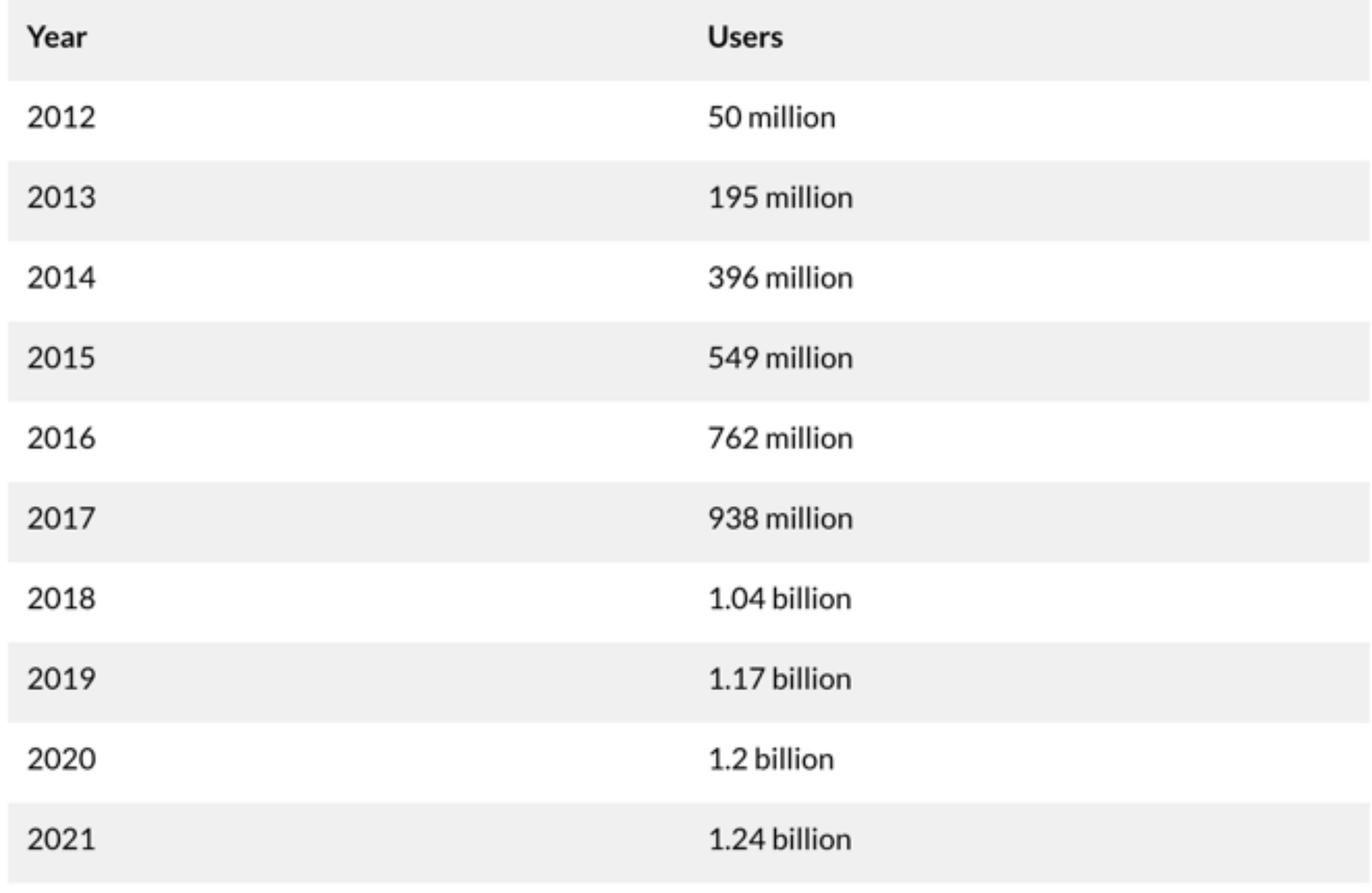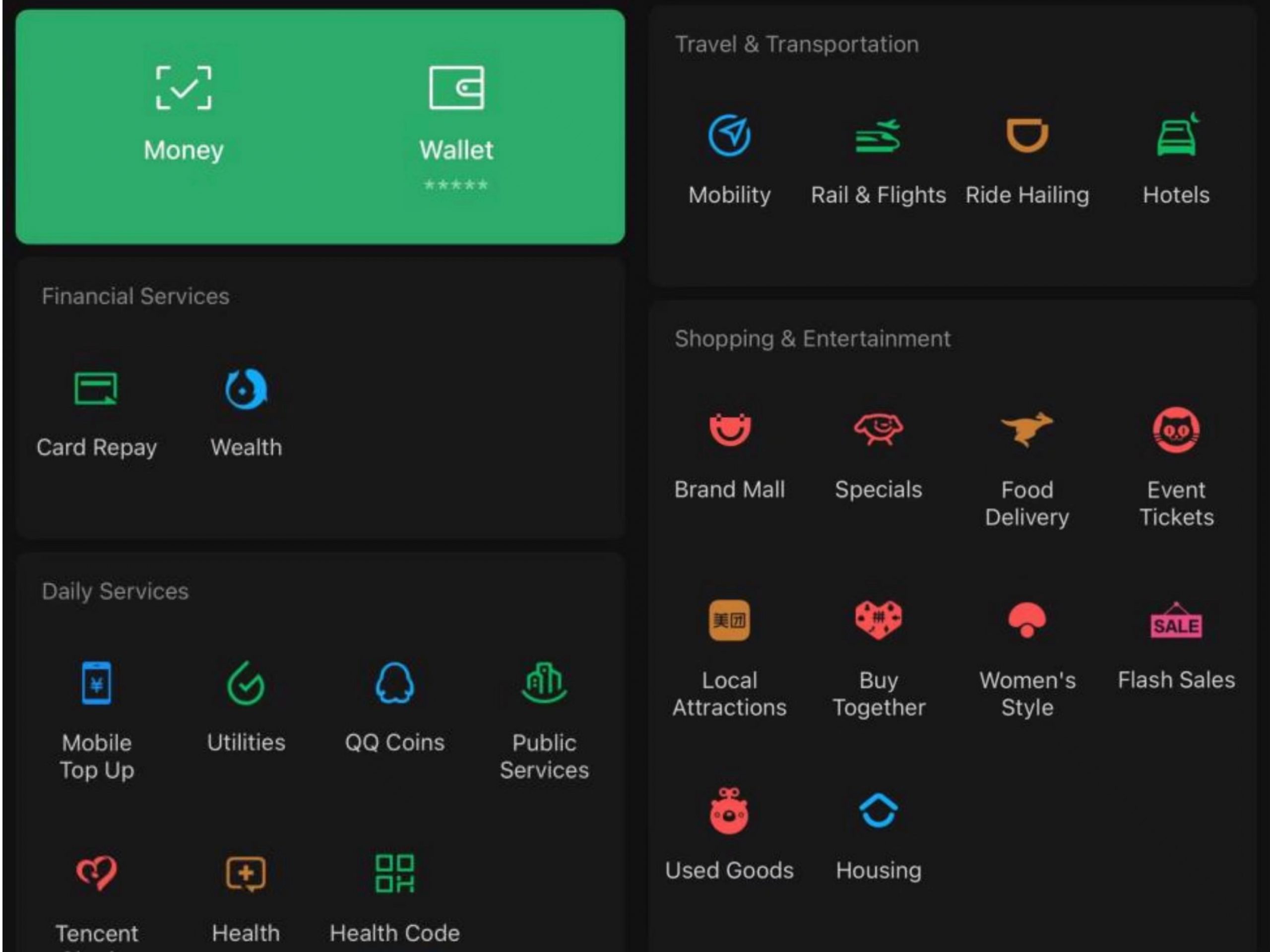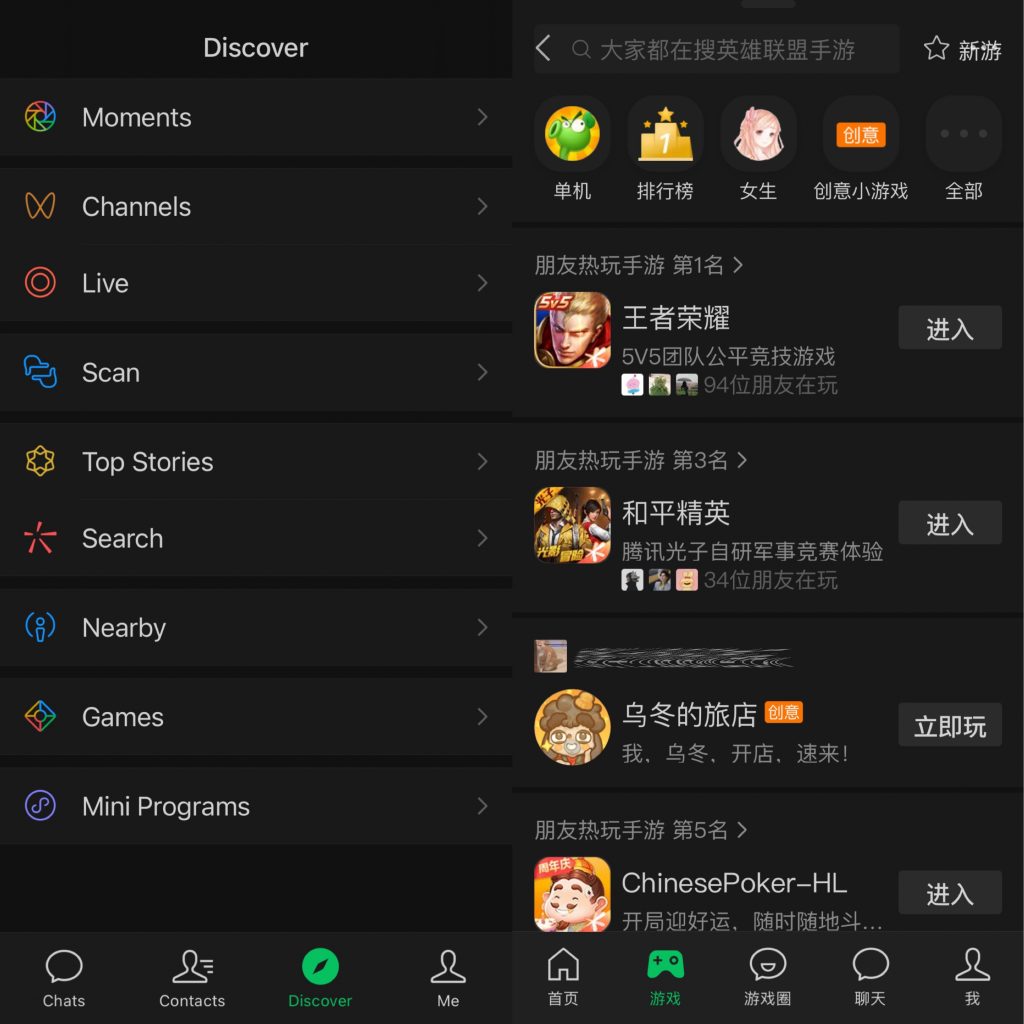

“Forget TikTok. China’s Powerhouse App Is WeChat, and Its Power Is Sweeping.” © 2020 by Paul Mozur is licensed under CC BY-NC-ND 4.0
Introduction
This essay is a case study focusing on the development of the WeChat business. First of all, the essay illustrates WeChat’s development and its major businesses. Then, it talks about whether WeChat management will succeed or not. User data from 2012 to 2021 are used to discuss whether WeChat is successful or not. At the same time, a case hypothesis is used to demonstrate the integrity of the WeChat business and its penetration into users’ daily life. WeChat businesses combine users’ online activities with offline ones, enabling them to live in the “ecological back garden”. Finally, the essay will explore the potential issues in the major operating model of the platform. The first problem lies in the fact that reading user data may lead to personal privacy leaks. The second problem is that the prohibition of access to external links may also lead to market monopoly. Although WeChat’s external restrictions have eased a bit, it remains a demanding task to break the information barrier.
China’s multifaceted messaging app: WeChat
Source: CNN Business (2017)
The Birth of WeChat and its Main Operating Areas
In 2010, the success of Kik and the arrival of the iPhone 4 brought new opportunities to QQ mail teams busy in developing “mobile mail” then. They substituted the previous name with“Weixin” or “Wechat”(“xin” in Chinese is similar to the English word mail), meaning micro mail. In 2011 when WeChat was first launched, its original users came from QQ due to its lack of user base. From WeChat1.0 to WeChat2.0, the platform only replaced operators to send messages and failed to provide services very different from those operators. In addition, its active users were significantly less than those of QQ and MiChat. Then, WeChat constantly strengthened its features, such as reading contact information from the smartphone and other platforms as well as supporting communication among many people. Until April 2011, the number of users registering in WeChat exceeded 4 million (Che & Ip, 2018).
After the year 2011, WeChat has committed to improving its instant communication function and helping users reshape their digital social community on the platform. It has developed a wide range of features, including adding contacts via mobile contact and QQ friends to form a relationship network of friends, “Nearby” and “Shake” features offering users opportunities to socialize with strangers, and QR code making it possible to establish offline relation chain. Beyond basic daily chatting, WeChat Moment has begun to provide users with a “self-polishing” platform in which users can share their daily life and feelings as well as interact with their friends, revitalizing the relation chain. The platform comes with an open interface, enabling the use of third-party apps within it.
In 2012, the advent of the WeChat subscription, accompanied by chatting feature and WeChat Moment, formed a closed loop of information spreading. Then, based on the social relation chain of users, the expansion of WeChat began to develop group community and community economy. Besides, WeChat mini-programs have further enriched users’ social life, leisure games, its interactions with other Tencent games, and its cooperation with other platforms, all of which have brought the business landscape into economic, entertaining, and cultural industries. The emergence of business mini-programs and WeChat subscriptions have renewed user data again (Harwit, 2017).
The secret of WeChat’s success

WeChat Revenue and Usage Statistics (2021) © 2021 by Mansoor Iqbal is licensed under CC BY-NC-ND 4.0
Since 2012, the number of WeChat users has grown constantly. Without a doubt, such a large amount of users prove the triumph of the platform. At present, WeChat boasts more than 1 billion daily active users and becomes the primary option for social networks and online chatting (Birkinshaw et al., 2019). A review of the ten-year development of WeChat shows that besides its surge in the number of users, WeChat Pay has become another essential sign of success. In the context of advocating digital economy and currency, WeChat Pay has overtaken Alipay as the preferred method of mobile payment, with more than 900 million users.

ALL WECHAT FEATURES IN 2020 © 2020 by Juan is licensed under CC BY-NC-ND 4.0
Thanks to technology development, WeChat, once called the “Chinese version of WhatsApp”, has evolved into more than a communication tool. It has integrated with multiple services supported by Facebook, Twitter, WhatsApp, Uber, Amazon, and Paypal (Lamaoyangjin, 2018). Wechat has built a complete industrial chain, involving daily travel, entertainment, and food and drink, etc.
Turning on WeChat, you can narrow your offline activities to your smartphone by arranging social events through your fingertips. Take an easy example. Suppose you are a community seller. You can ask a delivery man via the WeChat mini program to pick up packages that you need to send to your customers who ordered offline. Then, your WeChat friends invite you to have a meal outside and send you a restaurant address. You check the address on the digital map and find it is not so far from your home. Then you scan a sharing bike through Wechat, ride the bike to the destination, and pay by WeChat Pay. You order film tickets from the Meituan App and hire a taxi through Wechat to the cinema. The research and development of WeChat mini-programs and its business cooperation with other platforms include all your possible social activities. By virtue of its perfect and inclusive services, WeChat has become an instant communication tool penetrating into everyone’s daily life. Beyond all questions, WeChat’s biggest success relates to the fact that the platform has anchored its users within its ecosystem, making itself an indispensable part of their life.
WeChat’s Profit Model

“Wechat New Features, the Biggest Updates in the Past 4 Years!” © 2018 by Hacos is licensed under CC BY-NC-ND 4.0
As it mainly provides a platform for two-way communication, WeChat had no direct channel for profits at the very beginning but store a huge amount of user data. In a multilateral market, the generation of economic value requires digitalization (Mansell & Steinmueller, 2020). WeChat’s data resources have become the basic logic of its profit model. By connecting its video games on mobile to WeChat, Tencent has revitalized the social data of WeChat users to attract more game players, planning to make profits from promoting games on WeChat. One of the first batch of games promoted by the company has gained 25 million daily active users within 10 days after it was launched (Mozur, 2013).
After the 2018 Spring Festival, the company announced that the number of WeChat users exceeded 1 billion, which was partly driven by the increases in such online games as Honor of Kings, with a contribution of more than 40% of the group’s total revenue (Baccardax, 2018). In addition, the company’s profit rose by 70% year-on-year to US$2.72 billion and its revenue was up by 59% compared with the previous year. As the most valuable listed company in Asia, the firm has reached record-high profits and revenues. This has been driven by a 55% increase in advertising revenue because of a surge in the number of WeChat advertising (Owusu, 2017). Analysts have also shown that WeChat Pay and Scanning feature enable the app to be a mobile wallet and shopping assistant, finding a new way to make money. The company has also sold emojis and other virtual products via this app (Mozur, 2013).
Concerns about WeChat Platform
-
User privacy security
In the context of internet development, data have gradually become the oil of the new age. All platforms tag their users into different groups based on the user data they obtained and continue to improve the industrial chain at the same time, so as to create an inclusive ecosystem. In this process, WeChat grasps the social networks of users to stock their private data. That result is what the U.S. is worrying about. In the U.S., people fret that WeChat’s penetration into their daily life may lead to the disclosure of American information. For instance, the Trump administration banned the use of WeChat on the grounds that WeChat posed threat to national security because it was owned by China and it share American users’ personal data with the Chinese government (Arbel, 2021).

“WeChat Found Scanning User Photos in the Background as a Routine” © 2021 by Lore Apostol is licensed under CC BY-NC-ND 4.0
In contrast to the overwhelming concerns of American users, domestic users are more likely to take a care-free attitude. With the growing awareness of privacy protection, there is now an increasingly loud voice in China condemning WeChat for over-capturing user data. A finding released in September 2021 revealed how WeChat scan user albums regularly, which means Tencent’s apps are accessing personal data without permission (Apostol, 2021). Hacklous, a Weibo celebrity, also said that platforms owned by Tencent would spend as much as one minute scanning users’ pictures on their devices (Boris, 2021).
-
Market Monopoly Due to the Ban on External Links
As it focuses on limited exchanges among people and small groups, WeChat has attracted Chinese citizens to shift from other public activities on other platforms, such as Blogs and Twitter-like Weibo (Harwit, 2017). Simultaneously realizing various features (such as basic necessities of life, mobile payment, financial management, instant messaging, and online office) on a “Super app” may trap users into a software matrix built by one internet giant, significantly limiting their choices.
Thanks to the increase in digital platform scale and growing interest of users (namely, an intense network effect), such size and scale of the economy have given birth to a market structure– a natural monopoly (Mansell & Steinmueller, 2020). As platform owners have the basic operation autonomy, technology giants in China have traditionally prevented the links and services of their rivals from sharing on their platforms. For example, WeChat has strictly complied with regulations and rules relating to external links, putting a limit on users sharing content from Tik Tok owned by ByteDance.
In February, Tik Tok filed a lawsuit against Wechat in the Beijing Court, charging the company with a monopoly. However, Tencent claimed these allegations were unfounded (Reuters, 2021). The Ministry of Industry and Information Technology of the People’s Republic of China ( MIIT) held an administrative guidance conference meeting in September. The conference urged Chinese operators to stop blocking competitors’ links, which turned the spotlight on the discussion about whether internet platforms need to welcome external links from each other again (Xue & Gu, 2021). Currently, WeChat allows its users to visit external links as long as they comply with rules, such as never overusing these links.
Conclusion
In a nutshell, WeChat’s decade of development has proved that it has become one of the best instant communication tools. We also see the future development path for China’s platforms, with a comprehensive and systematic industrial ecology being the inevitable form of their development.
Tencent, built on user data as its foundation logic, has set up a whole industry, and consolidated user traffic on its social services to ensure the “web traffic bonus” in other branch services. Though we crown it as “platform capitalism” due to our concerns about its privacy security and market monopoly, we need to face and address the two problems on our exploration road.
Now, as for controversy over the two aspects, WeChat has made a positive response under the leadership and supervision of the state, and the public’s awareness of precautions and critical thinking is improving. As far as I’m concerned, powered by the development of technology and policy, privacy protection will get stricter and the wall of market monopoly will collapse one day. As a result, we need to take a generally optimistic attitude to view and urge the development and progress of WeChat from a dialectical mindset.
References:
Apostol, L. (2021, October 9). WeChat found scanning user photos in the background as a routine. TechNadu. https://www.technadu.com/wechat-found-scanning-user-photos-in-the-background-as-a-routine/305755/
Arbel, T. (2021, February 12). US distances itself from Trump attempts to ban WeChat. ABC News. https://abcnews.go.com/Business/wireStory/us-distances-trump-attempts-ban-wechat-75829270
Baccardax, M. (2018, March 21). Tencent holdings blasts Q4 earning as WeChat users top 1 billion. TheStreet. https://go-gale-com.ezproxy.library.sydney.edu.au/ps/i.do?p=AONE&u=usyd&id=GALE|A531762851&v=2.1&it=r
Birkinshaw, J., Ke, D. L. H., & De Diego, E. (2019, October 29). The kind of creative thinking that fueled WeChat’s success. Harvard Business Review. https://hbr.org/2019/10/the-kind-of-creative-thinking-that-fueled-wechats-success
Boris, T. (2021, October 9). WeChat to stop scanning photos in background after influencer’s exposè using Apple’s record app activity. Tech Times. https://www.techtimes.com/articles/266431/20211009/wechat-stop-scanning-photos-background-wechat-scanning-photos-apple-record-app-activity.htm
Che, X., & Ip, B. (2018). WeChat. In X. Che & B. Ip (Eds.), Social networks in China (pp. 45-70). Chandos Publishing.
CNN Business. (2017, May 17). China’s multifaceted messaging app: WeChat [Video]. YouTube. https://www.youtube.com/watch?v=B0vjuwQKb70
HACOS. (2018, December 24). Wechat new features, the biggest updates in the past 4 years! https://www.hacos.cn/en/blog/2018/12/24/c309bbe066/
Harwit, E. (2017). WeChat: Social and political development of China’s dominant messaging app. Chinese Journal of Communication, 10(3), 312-327. https://doi.org/10.1080/17544750.2016.1213757
Iqbal, M. (2021, June 21). WeChat revenue and usage statistics (2021). Business of Apps. https://www.businessofapps.com/data/wechat-statistics/
Juan. (2019, May 16). All WeChat Features in 2020. QPSoftware. https://qpsoftware.net/blog/all-wechat-features-2020
Lamaoyangjin. (2018). Nuevo modelo de periodismo 3.0 en China: El funcionamiento de la aplicación móvil Wechat [New model of journalism 3.0 in China: The operation of the Wechat mobile application]. Estudios Sobre El Mensaje Periodístico, 24(2), 1419-1431. https://doi.org/10.5209/ESMP.62225
Mansell, R., & Steinmueller, W. E. (2020). Economic analysis of platforms. In R. Mansell & W. E. Steinmueller (Eds.), Advanced introduction to platform economics (pp. 35-54). Edward Elgar Publishing.
Mozur, P. (2013, August 14). Tencent earnings: Games help profit rise; marketing costs for WeChat messaging app weigh on results. Wall Street Journal. https://www.proquest.com/docview/1420179679?pq-origsite=primo&accountid=14757
Mozur, P. (2020, September 4). Forget TikTok. China’s powerhouse app is WeChat, and its power is sweeping. The New York Times. https://www.nytimes.com/2020/09/04/technology/wechat-china-united-states.html ?_ga=2.206199635.1597091898.1634355317-1202047070.1634355317
Owusu, T. (2017, August 16). WeChat leads Tencent to big earnings beat. TheStreet. https://go-gale-com.ezproxy.library.sydney.edu.au/ps/i.do?p=AONE&u=usyd&id=GALE%7CA500729827&v=2.1&it=r
Reuters. (2021, September 17). Tencent bows to regulator, allows WeChat users access to rivals’ links. https://www.reuters.com/technology/tencent-says-will-allow-wechat-users-access-rivals-links-2021-09-17/
Xue, J. Y., & Gu, T. (2021, September 28). Blocking external links, a monopoly issue or not? Lexology. https://www.lexology.com/library/detail.aspx?g=fec3ab17-4f4c-432f-a560-8742b1d5f08f



